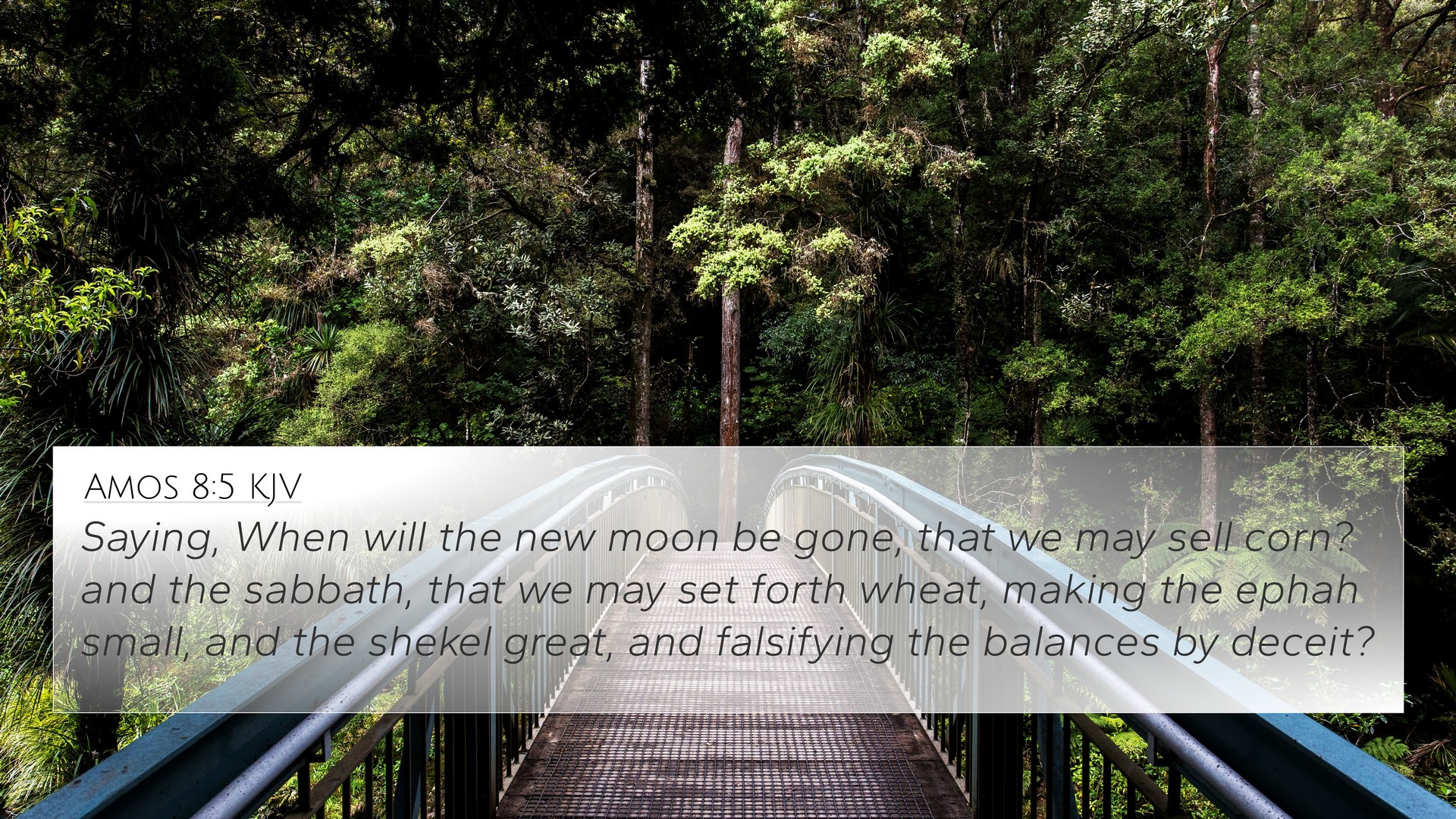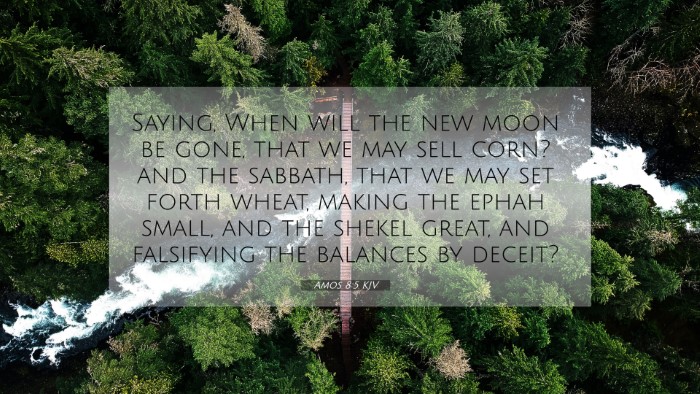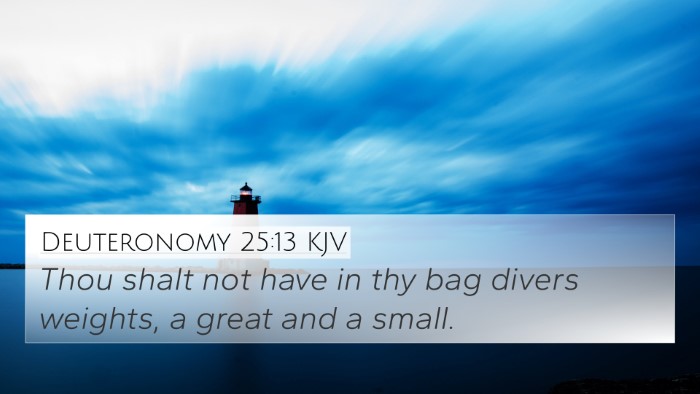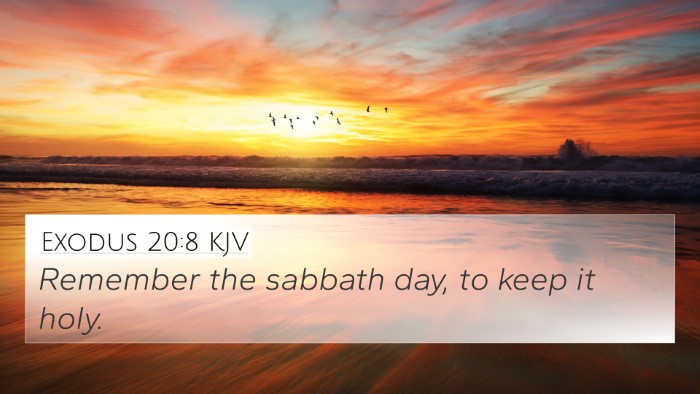Old Testament
Genesis Exodus Leviticus Numbers Deuteronomy Joshua Judges Ruth 1 Samuel 2 Samuel 1 Kings 2 Kings 1 Chronicles 2 Chronicles Ezra Nehemiah Esther Job Psalms Proverbs Ecclesiastes Song of Solomon Isaiah Jeremiah Lamentations Ezekiel Daniel Hosea Joel Amos Obadiah Jonah Micah Nahum Habakkuk Zephaniah Haggai Zechariah MalachiAmos 8:5 Similar Verses
Amos 8:5 Cross References
Saying, When will the new moon be gone, that we may sell corn? and the sabbath, that we may set forth wheat, making the ephah small, and the shekel great, and falsifying the balances by deceit?
Uncover the Rich Themes and Topics of This Bible Verse
Listed below are the Bible themes associated with Amos 8:5. We invite you to explore each theme to gain deeper insights into the Scriptures.
Amos 8:5 Cross Reference Verses
This section features a detailed cross-reference designed to enrich your understanding of the Scriptures. Below, you will find carefully selected verses that echo the themes and teachings related to Amos 8:5 KJV. Click on any image to explore detailed analyses of related Bible verses and uncover deeper theological insights.
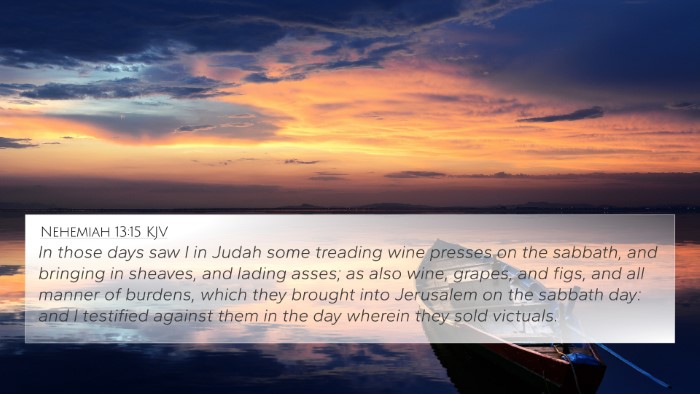
Nehemiah 13:15 (KJV) »
In those days saw I in Judah some treading wine presses on the sabbath, and bringing in sheaves, and lading asses; as also wine, grapes, and figs, and all manner of burdens, which they brought into Jerusalem on the sabbath day: and I testified against them in the day wherein they sold victuals.
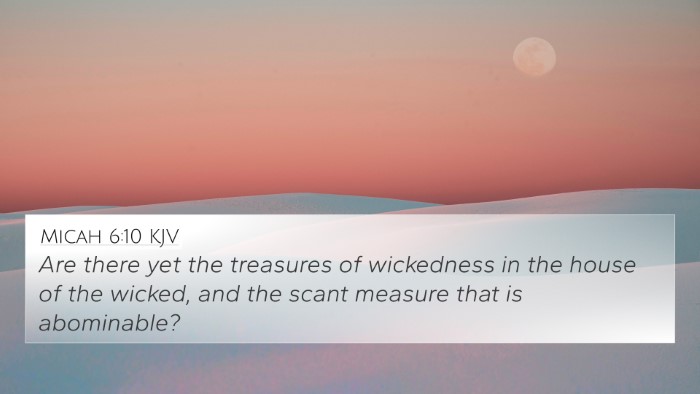
Micah 6:10 (KJV) »
Are there yet the treasures of wickedness in the house of the wicked, and the scant measure that is abominable?
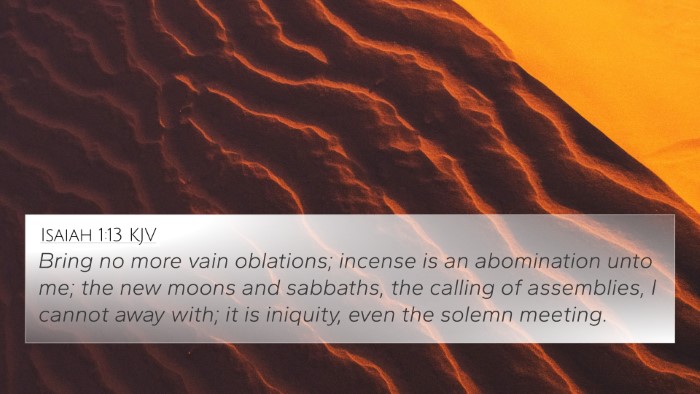
Isaiah 1:13 (KJV) »
Bring no more vain oblations; incense is an abomination unto me; the new moons and sabbaths, the calling of assemblies, I cannot away with; it is iniquity, even the solemn meeting.
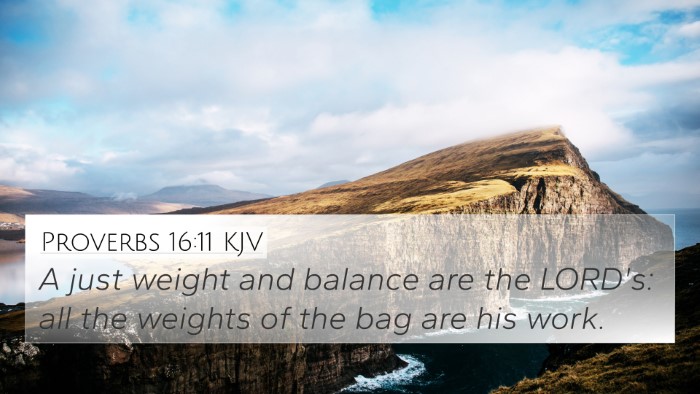
Proverbs 16:11 (KJV) »
A just weight and balance are the LORD's: all the weights of the bag are his work.
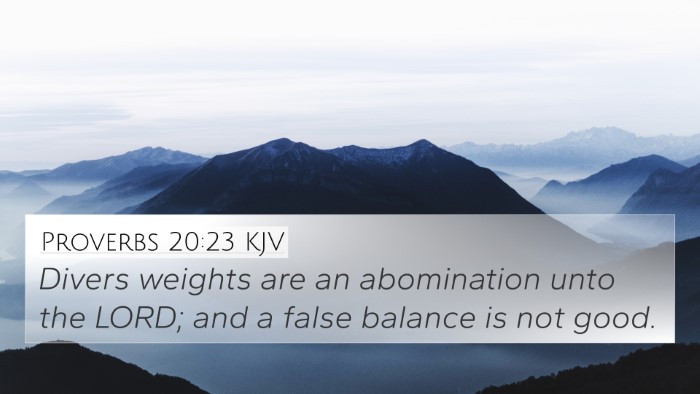
Proverbs 20:23 (KJV) »
Divers weights are an abomination unto the LORD; and a false balance is not good.

Psalms 81:3 (KJV) »
Blow up the trumpet in the new moon, in the time appointed, on our solemn feast day.

2 Kings 4:23 (KJV) »
And he said, Wherefore wilt thou go to him to day? it is neither new moon, nor sabbath. And she said, It shall be well.
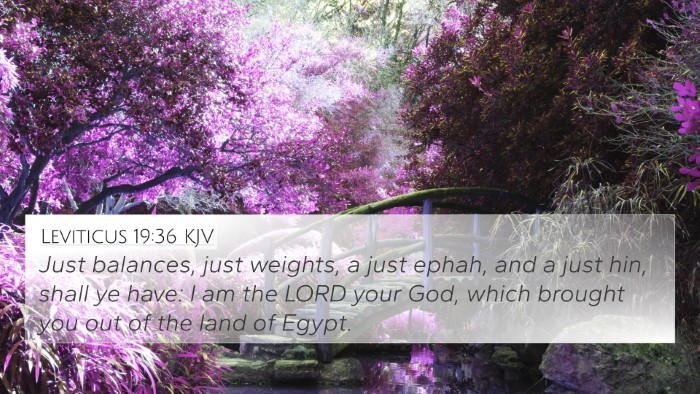
Leviticus 19:36 (KJV) »
Just balances, just weights, a just ephah, and a just hin, shall ye have: I am the LORD your God, which brought you out of the land of Egypt.
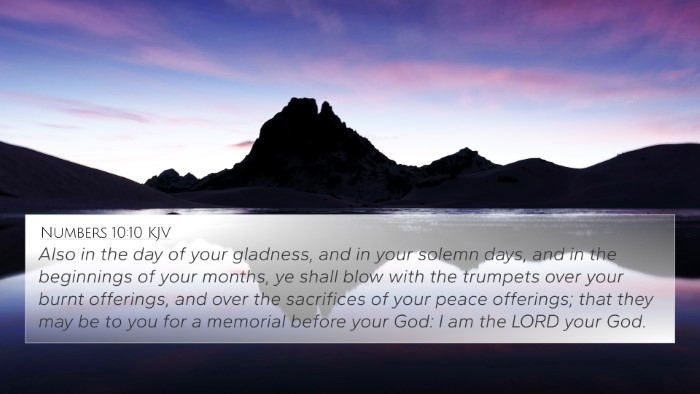
Numbers 10:10 (KJV) »
Also in the day of your gladness, and in your solemn days, and in the beginnings of your months, ye shall blow with the trumpets over your burnt offerings, and over the sacrifices of your peace offerings; that they may be to you for a memorial before your God: I am the LORD your God.

Numbers 28:11 (KJV) »
And in the beginnings of your months ye shall offer a burnt offering unto the LORD; two young bullocks, and one ram, seven lambs of the first year without spot;

Isaiah 58:13 (KJV) »
If thou turn away thy foot from the sabbath, from doing thy pleasure on my holy day; and call the sabbath a delight, the holy of the LORD, honourable; and shalt honour him, not doing thine own ways, nor finding thine own pleasure, nor speaking thine own words:

Malachi 1:13 (KJV) »
Ye said also, Behold, what a weariness is it! and ye have snuffed at it, saith the LORD of hosts; and ye brought that which was torn, and the lame, and the sick; thus ye brought an offering: should I accept this of your hand? saith the LORD.

Romans 8:6 (KJV) »
For to be carnally minded is death; but to be spiritually minded is life and peace.
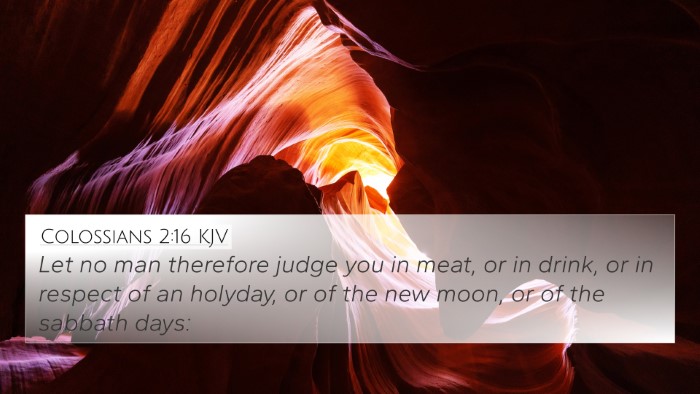
Colossians 2:16 (KJV) »
Let no man therefore judge you in meat, or in drink, or in respect of an holyday, or of the new moon, or of the sabbath days:
Amos 8:5 Verse Analysis and Similar Verses
Understanding Amos 8:5
Amos 8:5 serves as a poignant warning against exploitation and injustice, particularly in the context of Israel's moral decay. The verse reads:
"Saying, When will the new moon be gone, that we may sell corn? and the sabbath, that we may set forth wheat, making the ephah small, and the shekel great, and falsifying the balances by deceit?" (Amos 8:5 KJV)
Verse Meaning and Context
This verse captures the greed and impatience of the merchants in Israel who were eager to return to their business after the observance of religious festivals. Both Matthew Henry and Albert Barnes highlight the significance of the new moon and the Sabbath as times of rest and worship, which the merchants viewed as burdens hindering their financial gain.
Key Themes
- Exploitation: The merchants looked for opportunities to cheat the poor, indicating a deeper moral failing in their character.
- Religious Observance vs. Material Gain: There is a tension between the divine commandments to rest and the earthly desire for wealth.
- Judgment: Amos serves as a prophetic warning that such behavior will lead to divine judgment.
Cross-References with Other Bible Verses
To gain a fuller understanding of Amos 8:5 and its implications, one can examine the following cross-references:
- Micah 6:10-11: Discusses deceitful practices in trade, echoing similar themes of injustice.
- Proverbs 11:1: "A false balance is abomination to the Lord: but a just weight is his delight."
- Isaiah 1:13-15: Highlights the futility of religious observance without righteousness.
- James 5:1-4: Warns the rich about their exploitation and the cries of the laborers.
- Matthew 23:23: Jesus criticizes the Pharisees for neglecting justice and mercy while being meticulous about tithing.
- Amos 5:11: Further critiques wealth gained through oppression.
- Luke 6:24: "But woe unto you that are rich! for ye have received your consolation."
Thematic Bible Verse Connections
This passage reveals vital themes that are recurrent throughout Scripture:
- Justice and Fairness: The theme of just trade practices ties to multiple teachings across the Bible.
- Greed vs. Generosity: The contrast between earthly pursuits and the call to love one's neighbor.
- Religious Hypocrisy: The period of religious observance is undermined by immoral practices.
Comparative Bible Verse Analysis
In undertaking a comparative Bible verse analysis, Amos 8:5 stands out as a significant admonition against the compromise of faith-based ethics for monetary gain. Observing connections between the Old and New Testaments, we find an inter-Biblical dialogue that maintains consistent divine standards regarding justice. For example:
- In Exodus 23:10-11, the Israelites are commanded to let the land rest, emphasizing the sanctity of both the land and God's commands.
- Within the Gospels, Jesus condemns the love of money, aligning with the sentiments expressed by Amos.
Practical Applications and Tools for Cross-Referencing
Understanding verses such as Amos 8:5 benefits from engaging with tools for Bible cross-referencing:
- Utilizing a Bible concordance can help in locating similar themes or keywords across Scripture.
- A Bible cross-reference guide organizes relevant verses for deep study.
- Engaging in cross-reference Bible study methods cultivates a richer understanding of biblical themes.
Conclusion
Amos 8:5 offers profound insights into the consequences of prioritizing material gain over ethical behavior. The connections between Bible verses amplify the warning against such injustices and reflect God's continual call for justice, compassion, and sincere worship. Understanding this verse within the broader biblical narrative enriches one’s faith and commitment to living a righteous life.
Related Keywords:
- Bible verse cross-references
- Connections between Bible verses
- Cross-referencing Biblical texts
- Inter-Biblical dialogue
